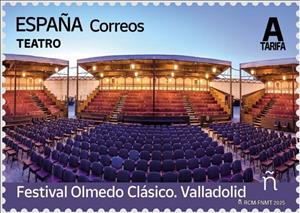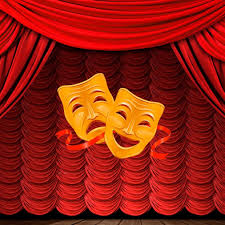Stamp: Olmedo Clásico Theatre Festival, Valladolid (Spain 2025)
Olmedo Clásico Theatre Festival, Valladolid (Spain 2025)
18 July (Spain ) within release Olmedo Clásico Theatre Festival, Valladolid goes into circulation Stamp Olmedo Clásico Theatre Festival, Valladolid face value A No Face Value
| Stamp Olmedo Clásico Theatre Festival, Valladolid in catalogues | |
|---|---|
| Colnect codes: | Col: ES 2025.07.18-01 |
Stamp is horizontal format.
Issued in both full panes of 25 and mini-sheets of 12. Face value € 0.89 on day of issue.Also in the issue Olmedo Clásico Theatre Festival, Valladolid:
- Stamp - Olmedo Clásico Theatre Festival, Valladolid face value A;
- Mini Sheet - Olmedo Clásico Theatre Festival, Valladolid face value 12*A;
Stamp Olmedo Clásico Theatre Festival, Valladolid it reflects the thematic directions:
A festival is an event celebrated by a community and centering on some characteristic aspect or aspects of that community and its religion or cultures. It is often marked as a local or national holiday, mela, or eid. A festival constitutes typical cases of glocalization, as well as the high culture-low culture interrelationship. Next to religion and folklore, a significant origin is agricultural. Food is such a vital resource that many festivals are associated with harvest time. Religious commemoration and thanksgiving for good harvests are blended in events that take place in autumn, such as Halloween in the northern hemisphere and Easter in the southern.
Theatre or theater is a collaborative form of performing art that uses live performers, usually actors or actresses, to present the experience of a real or imagined event before a live audience in a specific place, often a stage. The performers may communicate this experience to the audience through combinations of gesture, speech, song, music, and dance. It is the oldest form of drama, though live theatre has now been joined by modern recorded forms. Elements of art, such as painted scenery and stagecraft such as lighting are used to enhance the physicality, presence and immediacy of the experience. Places, normally buildings, where performances regularly take place are also called "theatres" (or "theaters"), as derived from the Ancient Greek θέατρον (théatron, "a place for viewing"), itself from θεάομαι (theáomai, "to see", "to watch", "to observe").


